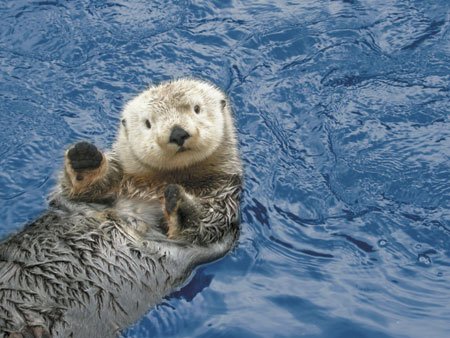
Sea otters have had to survive famine, disease, and clashes with boats, but shark attacks may be to blame for the significant decline in the cute creature populations around the California coast.
Scientists are mystified at the recent number – up to 30% of dead otters found along the coast have shark bites, up from ten per cent in the mid-1990s.
Mercury News reports that in 2011, 70 sea otters washed up on shore, showing tell-tale signs of a shark attack.
Some otter carcases even had shark teeth embedded in their skin.
Tim Tinker, a wildlife biologist with the U.S. Geological survey told the website that one popular theory is that sharks are mistaking otters as sea lions and elephant seals – their primary prey.
Those creatures, he said, have increased in population over the last decade and have moved to other locations.
Great whites have never been seen eating a whole otter for food, Mercury News reported, nor have they been known to actively hunt otters.
In 2011, a study revealed that there were about 219 great white sharks off the coast of California, fewer than originally thought.

Stanford University marine biology professor Barbara Block told the News that other sharks such as sevengills and makos could be the culprits of the attacks.
Barbara Block added: “It could be just a few individuals, or a few species.
“We need to keep in mind it’s a wild place out here.”
Another theory why sea otter populations are dwindling is that sharks are attacking female otters, who usually produce eight or more pups in a litter.
Without new generations of otters, the species will continue to struggle.
Tim Tinker said that there is nothing to be done about the supposed shark attacks, calling the trend, calling the shark’s behavior “natural”.
Sea otters are the heaviest members of the weasel family, weighing between 35 to 100 lbs. However, they are the second smallest marine mammal. Its coat is the densest in the animal kingdom and allows them to stay warm despite frigid water temperatures. They live on a diet of mussels, clams, crabs, and urchins. In recent years, fur trade and oil spills have whittled away otter populations.
[youtube M54LDt2LknU]